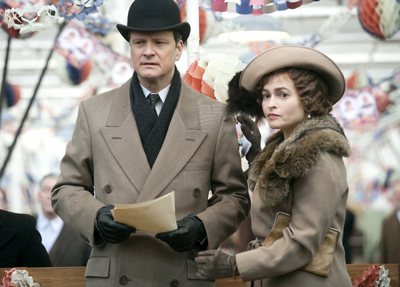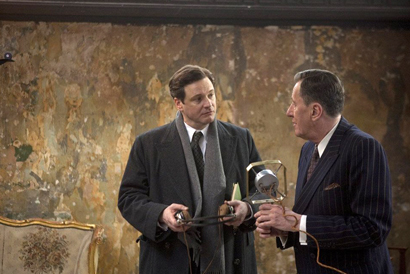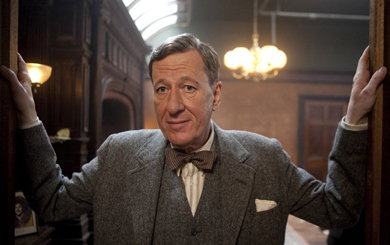
 |
|
|
|
I don't think I've run into a feature film that was more of a shoo-in for the Oscars than Tom Hooper's The King's Speech. This English production could do no wrong last Fall, as it thoroughly charmed audiences, critics, reviewers and the proverbial horses they rode in on. A stunning comeback to the winner's circle for The Weinstein Company, the movie couldn't be more providentially positioned. It's about English royalty, a subject for which there is apparently an unending reserve of audience interest, as was proven by the previous Best Picture winner The Queen. The movie has a simple conflict, that of a figurehead monarch struggling with a crippling personal handicap. It's not political; in fact, it downplays the dodgy politics of the time, in regard to the rise of Fascism on the European continent. And finally, it's intimate. The story really only involves a monarch-in-the-making, his concerned wife, and an eccentric speech therapist who must violate class barriers to help his royal patient. 
The film was nominated for twelve Academy Awards and won four, including a solid win for leading man Colin Firth. The trio of performances works so well in concert that we forget that the bulk of the movie takes place between two or three people in closed rooms. David Seidler's screenplay enlarges upon the personal problems of a troubled monarch without trivializing the world events around him. That we lowly commoners identify so well with the troubles of lofty kings and queens has always been a perplexing phenomenon, yet The King's Speech makes us care deeply about its deserving King George. The years between the wars find the English royal family with two problem sons. Next in line to the throne is Edward (Guy Pearce), who has little desire for the honor. Albert (Colin Firth) is secretly glad that the responsibility will fall to his elder brother, because of a terrible stammer that makes speaking in public all but impossible for him -- only Albert's close associates realize that he is a highly intelligent and capable man. Albert's wife Elizabeth, the Duchess of York (Helena Bonham Carter) sends Albert to various licensed speech therapists, but when their work fails the humiliated Albert resists further humiliation. Elizabeth then locates an Australian therapist named Lionel Logue (Geoffrey Rush), who practices in a dingy office. Logue has developed his own technique based on helping injured war veterans. Albert at first resists Lionel's program, which includes psychological elements and other personal prying that go against all notions of royal propriety. The tough process becomes tougher after the death of Albert's father, King George V (Michael Gambon). Edward cares only about his new lover Mrs. Wallis Simpson, who he cannot marry for political and religious reasons -- she's both American and a double divorceé. If Edward abdicates, Albert will become King George VI, just as the country is sliding into a war of survival against Nazi Germany. How can Albert represent his people, if he cannot speak in public? The King's Speech spells out the problem quite plainly, as Prince Albert stutters and stammers painfully through a simple speech for the radio. Albert's a model father but also the product of a sheltered upbringing. Even with the support of his wife-consort, he is unprepared for anything resembling self-analysis therapy. This is exactly what Lionel Logue's treatment requires, as the therapist must dislodge the formative trauma that affects his patient's speech patterns. Logue's normal patients were harmed by war experiences. Through a lot of arguing, it becomes clear that Albert was raised in an emotional strait-jacket under a disapproving father; his stammer at an early age became ingrained into his personality. To help Albert shake free of the affliction, Lionel uses physical exercises but also relaxation techniques that resemble progressive acting exercises. This, of course, makes for wonderful scenes of play-acting and other distraction-relaxation therapies. The somewhat stuffy Albert thus becomes more human and accessible to the audience. When the Prince, Elizabeth and Lionel behave as 'just folks' we witness the breaking of class barriers. Why are celebrities and royalty so lovable? Because we fantasize how special it would be for them to sit down and break bread with us? 
We're told that the film was not expensive, but the makers of The King's Speech have somehow managed to find private homes to fill in for government palaces and more than enough period trappings to convince us that we're seeing a much more lavish epic. The costumes are impressive but the actors do the heavy lifting. The King's Speech always convinces us that its drama extends beyond the edges of the film frame. The only concession to older forms is when we keep cutting back to a selection of 'ordinary folks' reacting to speeches on the radio. Plenty of American royalty buffs follow the details of English pomp & circumstance -- especially now with a royal wedding on the calendar. Most everything that happens in The King's Speech is slightly out of memory's reach. Most of us have heard of Prince Edward's famous 1937 'abdication for love'. And some of us have to check to make sure that this Prince Albert is not the legendary one "in a can" who needs to be "let out". The King's Speech will now become how people view this chapter of history, and various spokesmen are already protesting that the film is inaccurate. They say that the script downplays Prince Edward's friendly relations with representatives of Nazi Germany (including Adolf Hitler). Author Christopher Hitchens insists that Winston Churchill was in no way Prince Albert's close associate and advisor, as suggested in several scenes. It's probably too easy for anti-monarchists to question the film's entire setup: who says that Albert and Elizabeth were such warm & fuzzy folk, and that they would warm up to commoners as readily as they do in the movie? Were they even nice people? Well, Albert and Lionel definitely began a great friendship that included a token honor, if not full recognition. Albert's speech impediment might be likened in this respect to F.D.R.'s polio -- here in America an enormous public relations conspiracy successfully hid the fact that Roosevelt's polio made it impossible for him to walk or even stand by himself in public. The office of the President was so respected that the opposing political party never made political capital of F.D.R.'s poor health. Things have definitely changed. 1 The triumph of The King's Speech is that when Albert (now King George VI) addresses the nation on the war, we never think that all this concern has been so that a figurehead monarch can fulfill his strictly ceremonial duties. The King will now be armed and ready to address luncheons, dog shows and flower competitions, as needed to help the war effort. Photos of the real George show a serious, concerned fellow who wants to represent his people and communicate to them, with the aim of strengthening national unity. In 1939, England could use all the unity and strength it could muster. 
As an added kicker, The King's Speech has proved an enormous publicity aid for foundations seeking help for stutterers. Common speech defects are an underreported issue that, in our unpleasantly de-evolving pop culture, is once again becoming open season for cheap comedy. Seeing Colin Firth and Geoffrey Rush stampede through twenty humorous but undeniably useful vocal exercises is an excellent icebreaker for speech therapy. Score yet another solid reason for the film's soaring popularity. The film's central drama is so entertaining that little attention was given to its impressive supporting cast. Timothy Spall doesn't remind us much of Winston Churchill, but Derek Jacobi and Anthony Andrews have highly visible parts, and Claire Bloom makes a welcome appearance as Queen Mary. Anchor Bay and the Weinstein Company's Blu-ray of The King's Speech looks splendid. The non- first run film print I saw in a neighborhood theater was none too pretty, and this transfer has much more color. A great deal of attention was spent on the film's relatively few settings, especially Lionel Logue's consulting studio, which contains few but extremely well chosen furnishings. Shot on film, the movie was constructed from a digital intermediate taken from a 3-perf Super 35 camera original, an optimal arrangement. Oh, and by the way, Anchor Bay's disc is an R-rated version, with the film's use of four-letter words undisturbed. The last I heard, the Weinsteins were re-dubbing the entire film to get a PG rating. I'd make dissenting speeches, but at least the producer-distributors are not cutting a reel out of the film, the way they mangled so many foreign imports back at Miramax. The extras include a director commentary and an easygoing EPK-style featurette docu. Hooper and all of his cast members sit for an extended Q&A session taped after a screening. A featurette is offered on the real Lionel Logue; the producers approached his grandson not long before filming began and were given access to all of Logue's diaries. We also hear both of King George's speeches, from the beginning and the end of the war. The first appears to be the one dramatized for the film's conclusion. We only hear the King stammer a tiny bit but his cadence is very slow, sometimes with big gaps between individual words. Before seeing The King's Speech we might think that this is the way a Royal speaks, as if every syllable is being recited from an infallible holy text. After seeing the movie we can tell that the King is feeling his way through the words as if negotiating a minefield. History, as they say, comes alive.
On a scale of Excellent, Good, Fair, and Poor,
The King's Speech Blu-ray rates:
Footnote:
1. When I was a child I remember my mother talking about Prince Edward's abdication as a popular subject because the idea of giving up a kingdom for love was so romantic. The King's Speech does deflate that myth, by making Edward seem a lot less noble, and Mrs. Simpson something of a social climbing bore.
Reviews on the Savant main site have additional credits information and are often updated and annotated with reader input and graphics. Also, don't forget the 2010 Savant Wish List. T'was Ever Thus.
Review Staff | About DVD Talk | Newsletter Subscribe | Join DVD Talk Forum |
| ||||||||||||||||||